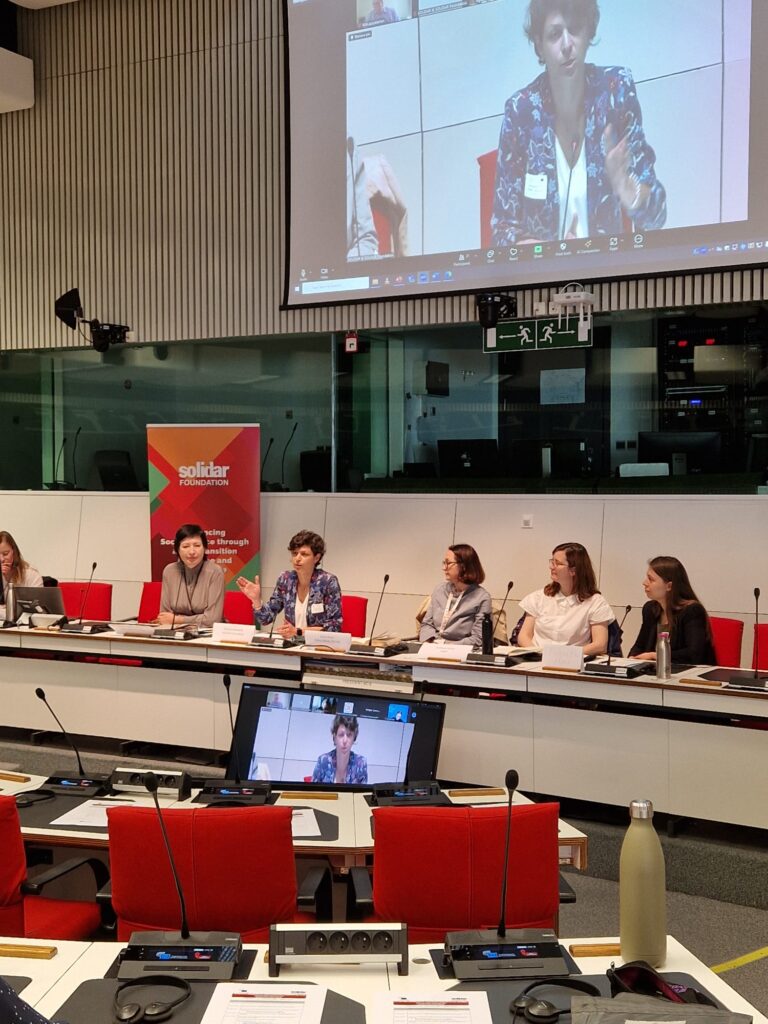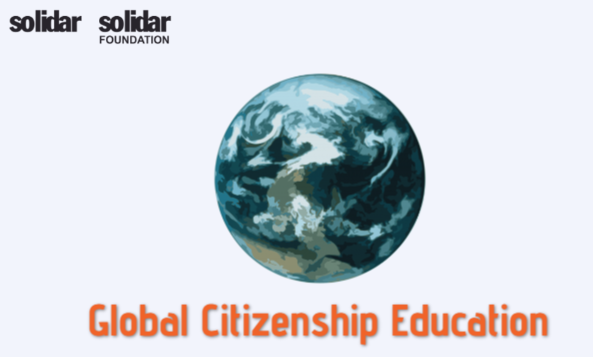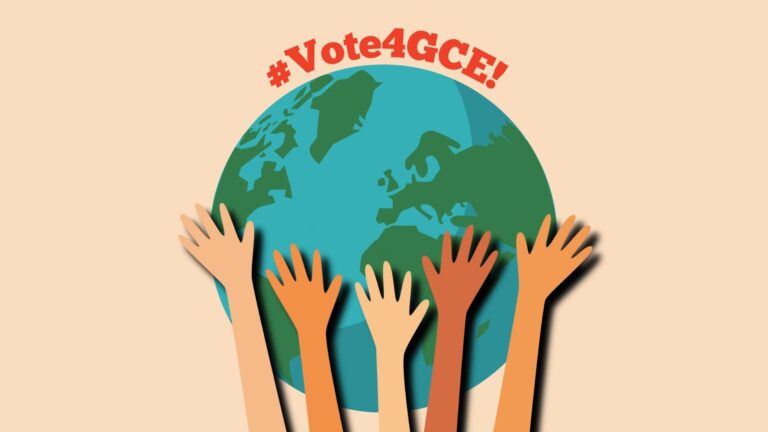HOW GLOBAL CITIZENSHIP EDUCATION IS EMPOWERING YOUTH AND STRENGTHENING DEMOCRACY
On May 21, SOLIDAR Foundation hosted a hybrid event at the European Economic and Social Committee (EESC) and online, bringing together civil society representatives, policymakers, and experts to discuss the role of Global Citizenship Education (GCE) in fostering democratic participation and exploring challenges and opportunities. The insights and discussions from this event will feed into a policy paper to be presented at SOLIDAR’s Thematic Annual Conference in October, marking a significant step in the advocacy cycle for GCE.
In the context of, but not limited to the European Elections, GCE plays a crucial role in strengthening democracy and promoting political engagement. To answer the question of what GCE is and create common understanding, Elizaveta Ebner, researcher at SOLIDAR Foundation, outlined the definition and importance of GCE as political education on a global scale, essential for fostering a sense of global community and strengthening democracy through a human rights perspective. This aims to help learners to navigate an increasingly complex world and take an active role in society, as reflected in SOLIDAR Foundation’s 2023 Policy Paper on GCE. Ebner noted that democratic participation involves actions, such as voting and civic engagement, and values, such as trust in democratic institutions. She stressed the need to identify policy gaps and move towards implementation, starting with teacher training at local level, and called for an EU-level study on GCE to address the challenges of youth democratic participation and declining faith in democracy.

Others agreed with the need to engage the whole community, particularly youth and teachers, and with the crucial role of local context. To illustrate this, Rocío Moreno (Awareness raising officer and project manager, Movimiento por la Paz (MPDL)) shared insights on their socio-affective methodology in education, which promotes learning through experiential and emotional engagement. Their work aims to empower citizens, particularly vulnerable groups, to participate actively in civic life and political advocacy, embodying the core objectives of GCE. Tatjana Babrauskiene (EESC, Workers Group) expanded on this need for practical engagement and defended the co-design of curricula with local communities as part of transformative education, engaging teachers through training to mobilize themselves and their students. She highlighted the need for practice-oriented education to develop students’ competences in knowledge, skills, and attitudes, stressing that current education focuses too much on skills, particularly those demanded by the labour market, to the detriment of values and attitudes that are key to the construction of a global identity.
Daria Arlavi (European Commission, DG EAC), introduced a crucial topic in the context of the upcoming elections: the political engagement of young people. The low levels of youth participation, despite a growing interest in politics, was a recurrent theme in the discussion, with the causes being rooted in disenchantment and disillusionment with democratic institutions, which is further exacerbated by an inadequate political response to the rising cost of living. In this regard, it was pointed out that GCE can empower young people to engage more meaningfully, by incorporating in the curricula values and skills that encourage active civic participation and awareness of global challenges.
Hence, engaging students in GCE from an early age is crucial, with students with high levels of GCE reporting positive attitudes towards the EU, mobility, and sustainability. However, it is also essential to ensure decent living conditions, such as affordable housing and fair wages, to build youth’s trust in democratic institutions.
In a more practical sense, the participants discussed the need for establishing key definitions, common understanding, and benchmarks. Rilli Lappalainen, chair of Bridge 47 and President of CONCORD, called for a legally binding framework for GCE, highlighting its crucial role in fostering critical thinking skills amidst the rise of discrimination and disinformation. Jo McAuley, Head of Research and Peer Review, GENE, highlighted the European Declaration on Global Education to 2050 (Dublin Declaration) as crucial for advancing GCE across the EU. Raffaela Kihrer, Head of Policy and Deputy Secretary General, EAEA, stated the importance of GCE in enabling adult learners to tackle future challenges and build sustainable communities. She pointed to the need for a clear definition of GCE, coherent policies, a comprehensive framework, better institutional interconnections, established benchmarks, and extensive teacher training. In pursuing these objectives, Kelsey Beltz, Global Partnerships and Education leader, The Good Lobby, pointed out that GCE should adopt a bottom-up approach, ensuring it is accessible for everyone by breaking it down clearly, highlighting the urgent need to engage young people in politics. Overall, challenges include reluctance from education providers to prioritize GCE due to labour market demands and limited capacity for actors involved, including CSOs.
During the Q&A session, participants underscored the importance of connecting with youth who feel alienated from politics. The key issue lies in bridging the gap between youth interest in politics and their feeling of representation. Promoting participation and a sense of belonging in the global community, requires social action from an intergenerational perspective, and that starts with a more practical-oriented education that builds key competences, as well as moving from awareness to action involving the whole community. A comprehensive policy approach, common understanding, systemic educational reforms, and social action are essential for the development of GCE, ultimately fostering active engagement and a fairer, more peaceful society.
Click on the downloadable report of the Policy Roundtable to learn more about the discussion!




